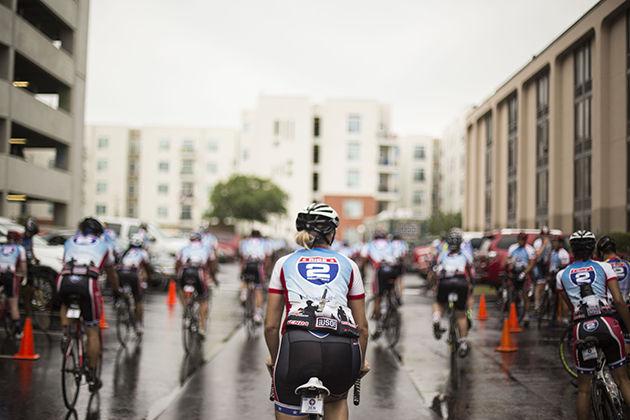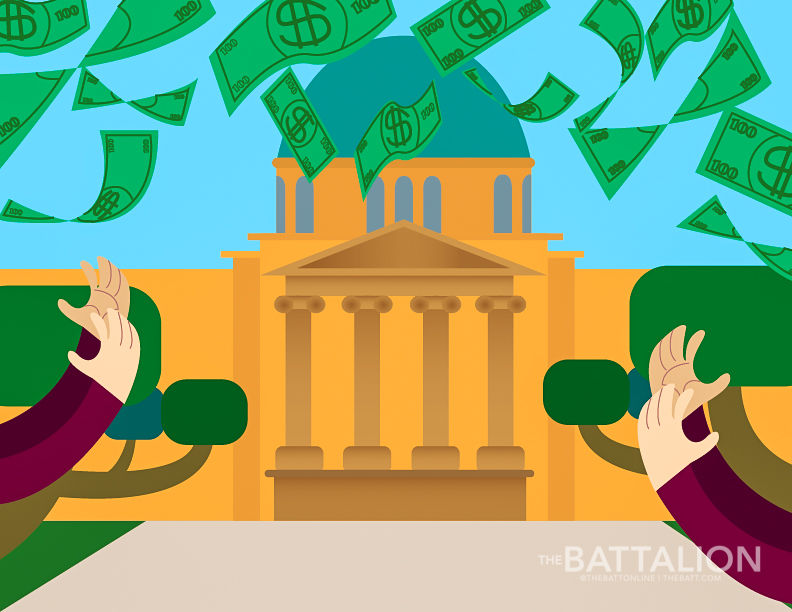One hundred and fifty veterans biked into town Monday.
Their stop in College Station marked one of many pit stops on the route of the Texas Challenge, a 490-mile, six-day rehabilitative ride from Houston to Fort Worth. The challenge is part of the UnitedHealthcare Ride 2 Recovery program, which started in 2008 to provide injured veterans from all backgrounds with resources to cope with the experiences they may face.
The Texas Challenge aims to give injured or retired veterans and first responders an opportunity for rehabilitation and recovery — both physical and mental — and bonding with others in similar circumstances. The week-long ride consists of between 50 to 100 miles each day, with rest stops and town visits along the way. The riders arrived in College Station for an overnight stay Monday afternoon and will leave Tuesday at 7:45 a.m. after visiting with community members at the George Bush Presidential Library.
“When they ride with other veterans that have maybe had similar problems or circumstances, it’s a bonding experience,” said Sheri Goldberg, UnitedHealthcare Ride 2 Recovery spokesperson. “They bond and have this camaraderie — they meet people they can talk to … We have veterans who have physical injuries; we have multiple amputees on some of our rides. We have folks who suffered from traumatic brain injuries or have PTSD.”
Jonathan Dade, veteran and participant in multiple UnitedHealthcare Ride 2 Recovery events, said his biggest struggle with transitioning out of the military was being afraid to mention injures or other struggles. He said he developed severe depression after leaving the military.
Citing the Department of Veteran Affair’s statistic that 22 veterans committed suicide each day in the year 2010, Dade said the trauma and stressful situations veterans are left with after leaving the military are often too much to handle.
“One of my friends recognized that I was struggling with those things, and he introduced me to Ride 2 Recovery and had me do the Memorial Challenge, which was in Washington, D.C. back in 2012,” Dade said.
Dade said after participating in the ride two times, it became a form of therapy for him.
“It’s halfway between a hobby or a project for people to work on and give them something to look forward to, and the other half is more like a therapy concept,” Dade said. “It’s actually what I turn to instead of using medication or trips to a psychologist or see other doctors — it’s what I do to work through my issues.”
The ride is sponsored by UnitedHealthcare, and with its support, hotel rooms, flights, meals and even clothing were paid for, said Goldberg. The sponsorship also enables the organization to provide adaptive bikes to meet the specific needs of veterans.
“We have one veteran who is missing an arm, and we fixed a bike for him with electric brakes so he won’t fall off while he’s riding,” Goldberg said.
Goldberg said some pit stops are located at places like museums, schools and fire stations to allow the community to show support for the veterans.
“It’s a big deal to our veterans,” Goldberg said. “And a lot of people just open their arms and their hearts, and a lot of schools along the way come out and they wave flags and shake hands with everybody, and some of them have programs and they sing songs and they play music, so it’s a great morale booster for everybody.”
Dade said the pit stops in towns along the route show him the support the community has for veterans.
“If you think back to the days of the Vietnam War, communities in America weren’t strongly supporting the veterans coming back. Nowadays it’s severely different, but still sometimes veterans aren’t connecting with people who are supporting them,” Dade said. “So I think it’s really cool when we stop in a city like Tomball or Georgetown or College Station — each one of these cities is able to tell us how much the community supports us.”









